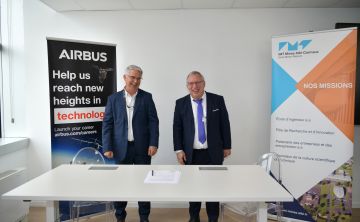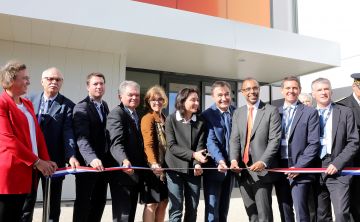SDG 7: Affordable and clean energy
IMT Mines Albi is working towards the decarbonization of energy and the optimization of household energy use. It contributes to the growth of renewable energy in both its new facilities and in energy renovations, via research and projects.
Energy in engineering and masters’ programs
-
Energy, industrial and digital transition on the curricula
In order to address the challenges of the future, our engineering curricula have been re-designed to include subjects on transition in each program. A “HUMANITIES & TRANSITIONS” discharge module provides students with teaching and meetings with experts to enhance their understanding of these transitions, notably via the “Rendez-vous des Transitions” events (RDVT), which prepare students to play a central role in energy, industrial and digital transitions (meetings with stakeholders, trans-disciplinary approach, expert views on emerging systemic issues). Students can also participate in a climate fresk.
-
An option in Renewable Energy and a specialized Master’s in positive-energy buildings
Among the options available to students, the Renewable Energy, Sustainable Production and Building course allows students to specialize in the fields of:
- Sustainable buildings and cities
- Conversion, distribution and clean production
- Energy and digital transition
The BE+ Specialized Masters in Positive-Energy Building trains experts in the reduction of environmental impact in the construction and renovation sector.
Sector expertise with the RAPSODEE UMR CNRS 5302
The RAPSODEE (Albi Engineering Research Center for Divided Solid Processes, Energy and the Environment) UMR CNRS 5302 laboratory leads research in the field of renewable energy, biomass, waste and eco-activities. Their research focuses specifically on the production of energy vectors and materials with controlled properties, in addition to renewable energy procedures (solar and biomass).
Environmental management on campus and the energy-saving / decarbonization policy
-
Passive student residence
Inaugurated in 2016, the Jarlard 5 student residence is an energy-efficient “passive” building. It uses a third of the energy requirements of standard new student accommodation. The building also serves as a base for study, with certain units equipped for students’ practical works. They can measure the impact of their energy use by adopting eco-friendly habits. The roof of the residence is equipped with solar panels.
-
Bâtiment Innov'Action: a venue for innovative students and companies
The “Bâtiment Innov'Action” building, inaugurated in October 2018, houses equipment for students’ practical tasks, but is also a venue devoted to innovation, with an incubator, fablab (La FaBrique) and co-working space. The 1,200m2 pooled facility is a certified E3C1 positive-energy, low-carbon building.
-
Energy-saving plan
The school launched an energy-saving plan which applies to the campus, student residences, dining hall and main building. IMT Mines Albi plans to install a wood-fired heating unit in 2023 to meet the heating needs of the main building (amphitheaters, media library, offices and laboratories, etc.). The unit will consist in a single wood boiler connected to the existing heat network, which will also retain its gas-fired boilers.
-
Procurement of electric service vehicles
The school opted for the purchase of electric service vehicles for the renewal of its auto fleet (7 electric service vehicles to date).
Available documents:
- carbon footprint
- energy audit
Find out more about Sustainable Development Goal n°7


